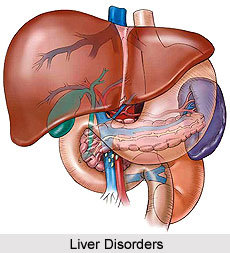 Liver disorders are commonly found in people all around the world and are capable of leading towards more severe health disorders, if not treated in time. There are several factors identified as probable causes of liver disorders. Most types of liver disorders are involved with improper dietary habits or lifestyle. Though the causes of liver disorders may vary according to different types, there are a few factors that can be found in almost all types of liver disorders. Knowing the risk factors for a particular disorder helps a lot in choosing the right treatment method.
Liver disorders are commonly found in people all around the world and are capable of leading towards more severe health disorders, if not treated in time. There are several factors identified as probable causes of liver disorders. Most types of liver disorders are involved with improper dietary habits or lifestyle. Though the causes of liver disorders may vary according to different types, there are a few factors that can be found in almost all types of liver disorders. Knowing the risk factors for a particular disorder helps a lot in choosing the right treatment method.
Viral and bacterial infections are considered the two most common causes of liver disorders. Three types of Hepatitis viruses named as Hepatitis A, Hepatitis B and Hepatitis C are a common reason behind most cases of liver disorders. The Hepatitis C virus is also known as Cirrhosis and the liver disorders caused due to this virus are known as Liver Cirrhosis. The Hepatitis A and B viruses can be prevented through vaccination and can be treated as well. However, there is no vaccine available for Liver Cirrhosis and it is quite difficult to treat this disorder. The three Hepatitis viruses can spread through sewage, contaminated food and water, sharing of infected needles, direct blood-to-blood contact, contact with infected semen, blood and also from mother to newborn.
Obesity is counted amongst the primary causes of liver disorders. A person usually becomes obese by following an improper dietary habit over a long period of time and as a result, he has a higher risk of developing liver disorders. Another common cause is alcohol consumption. Generally, the process of liver`s metabolising alcohol is affected by the factors like gender, age, nationality, weight and overall health conditions. The normal liver function is interrupted if the liver contains too much alcohol and this eventually leads to a chemical imbalance. The liver cells may also be destroyed or altered if the liver is required to detoxify alcohol continuously. This may result in fat deposits (fatty liver) and may also cause the more severe complications like inflammation (alcoholic hepatitis) or permanent scarring. a possibility of developing liver cancer cannot be negated as well.
It has been found that many types of liver disorders are caused due to defective genes. These types of disorders may be diagnosed in infancy or may not be diagnosed until a much later period in life. The most common types of liver disorders caused due to genetics include hemochromatosis, Wilson`s disease, tyrosinemia, alpha 1 antitrypsin deficiency, Glycogen Storage disease, etc. Various autoimmune disorders may sometimes become causes of liver disorders. The body`s immune system may sometimes begin to attack the liver or bile ducts and, thus, cause inflammation and scarring. This may lead to a progressive form of liver disease. The diseases caused by autoimmune disorders include primary biliary cirrhosis (PBC), primary sclerosing cholangitis (PSC), autoimmune hepatitis, etc.
Sometimes, certain drugs and toxins taken for curing other diseases may become a probable cause for liver disorders. The liver usually processes most of the chemicals and medications that enter one`s body and as a result, it becomes vulnerable to acute or chronic liver disease caused due to chemicals. Though most types of such diseases are predictable, there are a few severe types of disorders that cannot be predicted. Usually, there are three types of liver toxicity found in human beings that include the dose-dependent toxicity, the idiosyncratic toxicity and drug allergy. Cancer is considered another common cause of liver disorder. Though the liver cancer is not that common, there are many forms of cancer that often metabolise in liver. Cancer may also originate and develop in the liver, in cases of advanced liver diseases.
Apart from the above mentioned factors, there are also a few other causes of liver disorders. These factors include congenital birth defects, or abnormalities of the liver present at birth; inherited disorders of iron and copper metabolism, or defects in basic body processes; nutritional deficiencies; trauma, or injury; repeated episodes of heart failure with liver congestion and bile-duct obstruction; etc. However, it is always better to take preventive actions for restricting these causes, as the maxim goes, "Prevention is better than cure".




















